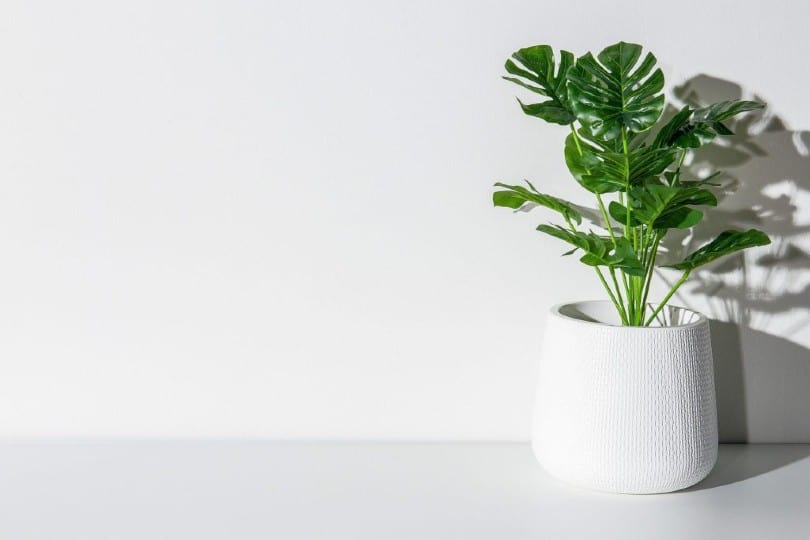Owning pets and plants at the same time can be a challenge. After all, dogs are always eating things they should avoid, and plants can be pretty toxic. So, if you have your eye on the Monstera plant, know that these plants are toxic to dogs and can cause mild to severe oral irritation and gastrointestinal upset.
Luckily, if your dog eats Monstera, it isn’t fatal—but they sure will feel it. So, here we will go over why the plant is potentially upsetting to dogs and what you can expect when your dog eats part of it.
Monstera Plants: The Toxicity
According to the ASPCA, the Monstera plant is toxic to dogs and cats. While that is true, the side effects are usually mild at most. Your dog would have to eat a lot to feel some pretty severe consequences.
Once they get the Monstera plant in their mouth, they will probably spit it right back out due to its bitter flavor and instant mouth irritation.
It’s likely going to cause just a few side effects like swelling, irritation, and gastrointestinal upset. If you see that your dog has eaten some of this plant, they might’ve already upchucked.
If your dog is brave and consumes a decent portion of the plant, a vet trip may be imminent. And, of course, all dogs handle ingested substances differently.
In any case, it’s best to keep Monstera leaves out of your dog’s mouth.
Calcium Oxalate Crystals
The reason the ASPCA considers a Monstera a toxic plant for dogs and cats is that it contains calcium oxalate crystals. These indigestible crystals cause immediate discomfort and irritation.
While uncomfortable, it’s best that the plant responds this way. The more your dog eats, the more severe the side effects. But since the taste of the Monstera instantly deters them, it means they will stop and most likely not even swallow the pieces they took.
Even though they will have some pretty strong effects, it won’t kill your dog. So, while toxic, your dog should learn not to snack on house plants.

What to Watch For
If your dog snatched a hold of your Monstera, you’d probably notice the effects right away. Some of these include:
- Salivating
- Drooling
- Whining, panicking
- Swelling
- Inability to swallow
The best thing to do in this situation is to make your dog comfortable. If you like a natural approach to healing in dogs, you could try out these botanical remedies recommended by PetMD.
Call the Poison Control line if you think they could have ingested something other than the Monstera plant. Also, get them to the vet if they show major side effects not mentioned here (such as labored breathing, seizures, unconsciousness, or obstructive swelling.)
Repairing Your Monstera
The bitten portion of the leaves or stalks will likely be irreparable. You can simply cut off the affected portion of the plant and allow it to regenerate.
It might look unsightly for a while, but the Monstera is a very resilient plant.
Keeping Monstera Away From Pets
Keeping your Monstera plant away from your dog might be challenging. These plants grow very tall and have giant sprawling leaves, which limits the space you can put them.
Considering every living space, you may or may not have a place to put a Monstera where it is entirely safe and away from your dog. If this is the case, it might be best not to own these plants to avoid these sorts of situations. There are plenty of other large houseplants you can get that don’t pose the same risks. You can check them out here.
Conclusion
So now you know that due to calcium oxalate crystals, the Monstera plant is technically toxic to your dog. However, the effects are immediate, causing instant irritation to the mouth, which might prevent your pet from ingesting any of the plant.
Generally, effects are mild to moderate and are often manageable at home. But if you think that your dog is experiencing significant swelling in the throat, it is best to get them to your vet for treatment or evaluation.
Featured Image Credit: 20750684, Pixabay














